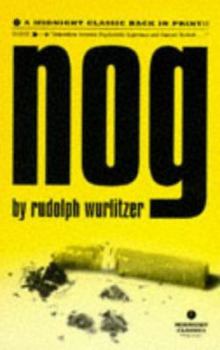Nog
Select Format
Select Condition 
Book Overview
" Nog is to literature what Dylan is to lyrics."--Jack Newfield, The Village Voice "A new kind of American travelogue."--David Ulin, Los Angeles Times Book Review "Somewhere between Psychedelic... This description may be from another edition of this product.
Format:Paperback
Language:English
ISBN:1852424230
ISBN13:9781852424237
Release Date:April 1997
Publisher:Serpent's Tail
Length:176 Pages
Weight:0.30 lbs.
Dimensions:0.5" x 5.0" x 7.8"
Customer Reviews
5 ratings
A Breath Mint For Your Mind
Published by Thriftbooks.com User , 17 years ago
Nog was one of those books that taught me more about writing at the time than all my college courses lumped together. I remember buying this book in its Pocket Books incarnation in the autumn of 1970. The book cost me $.95 cents brand spanking new, but, as they claim on the Master Card commercials, the experience is priceless. I stayed up all night reading the book and raving to my roommates the following morning. One read it; the other demurred. Simply put, it is one of the great classics, not just of an era but in modern American Lit. I still have that original copy of Nog. I handle it with care.
Rudolph Wurlitzer writes an American Classic
Published by Thriftbooks.com User , 18 years ago
After being badgered by the Casa Marina Reading Club in the late '70's to read this (resulting in my subsequent slide into Nog-like obscurity), I can state with some experience that this book exerts an influence on its readers. Rumors abound that Wurlitzer was an itinerant goat herder who strived to simplify his life: to date these rumors are unsubstantiated. However, there is evidence that "Nog" is an influence in the writings of Thomas Pynchon and Christopher Moore. Chuck Norris has been known to quote significant passages from the book in some of his Westerns and credits the book with his zen-like approach to martial arts. A good read - and a way of life.
Greatest novel of the counterculture
Published by Thriftbooks.com User , 25 years ago
There were very few exemplary novels to come out of the 1960s: maybe "The Crying of Lot 49," by Pynchon, "Been Down So Long It Looks Like Up To Me," by Richard Farina [which unfortunately has not worn well], "Twilight Candelabra," by William J. Craddock [okay, I'm not completely serious here], and the best one of all, the one that social anthropologists should consult when trying to make sense of that mad decade -- "Nog." Wurlitzer went off to Hollywood soon after, and certainly never achieved this kind of inspired prose again -- though "Flats" influenced Sam Shepard a great deal, and "Slow Fade" has its moments, but more recently he seems burned out. "Nog" is the quintessential "stoner" novel of all time. As such it's a significant document; more importantly perhaps, it's endlessly entertaining and diverting. Wurlitzer was here as original as anyone writing in English since WWII.
This book is full of unhealthy mental excitement.
Published by Thriftbooks.com User , 25 years ago
I wish that I could take credit for the "unhealthy ..." quote, but it is attributed to Donald Barthelme from his capsule review which appears on the back cover of my old paperback copy. Writing about Nog, Pynchon proclaimed, "The novel of bull **** is dead." I thought that the book was marvelous. Wurlitzer has a field day with issues of identity, integrity and all sorts of other topics that, as far as I am concerned, were explored in a manner that was much more compelling during the late '60s and early '70s. The notion of a character who invents/chooses his "memories" tickled my fancy then as much as now. Wurlitzer has always been willing to step out into areas where other authors were either afraid or simply unwilling to follow. Try to find the video of "Two Lane Blacktop" if you haven't already seen it. Wurlitzer wrote the screen play and that of "Pat Garrett & Billy the Kid" as well. If unhealthy mental excitement is appealing to you, I would recommend this work highly. If not, save your yourself some upset and read something a bit more tame.
A Surrealistic Existential Nightmare Classic
Published by Thriftbooks.com User , 25 years ago
I may have been one of the first people to read this book. God knows for years I would thrust my tattered copy at friends and insist they read it. My best friend and I still use phrases in conversation that we picked up from the book 20 years ago ("hasten a focus" comes to mind). For some reason I even remember the moment I purchased the book, in paperback, in a Woolworth's back in 1970, mostly because of its "psychedelic" cover art and the promise that "Nog is to literature what Dylan is to music." After a single, futile attempt at reading it, I found it on the shelf in my old bedroom at my parents' house one day in 1974, and noted that a glowing blurb from my favorite author, Thomas Pynchon, graced its back cover. If there is a message in "Nog", it may be: mental illness and hallucinogens are probably not a very good combination. Then again, there's more to "Nog" then meets the eye.





